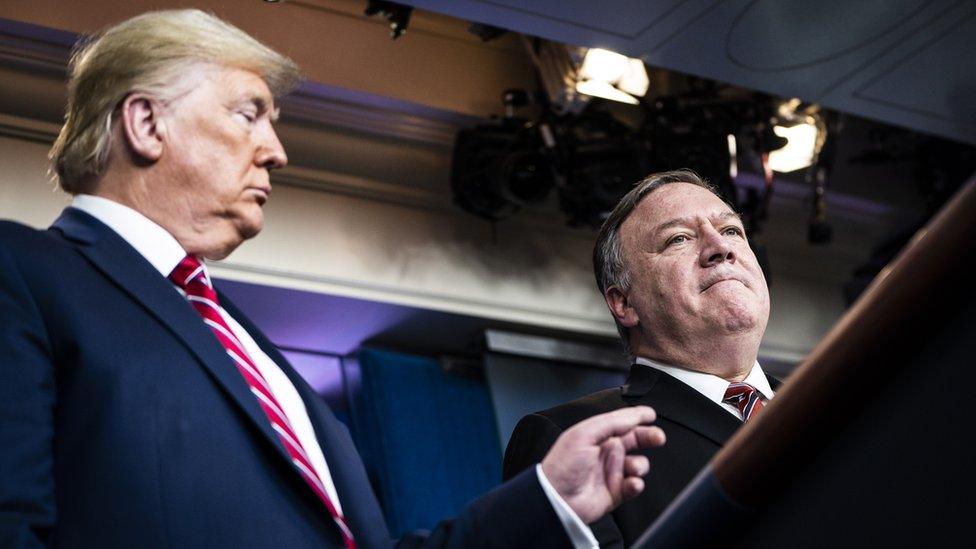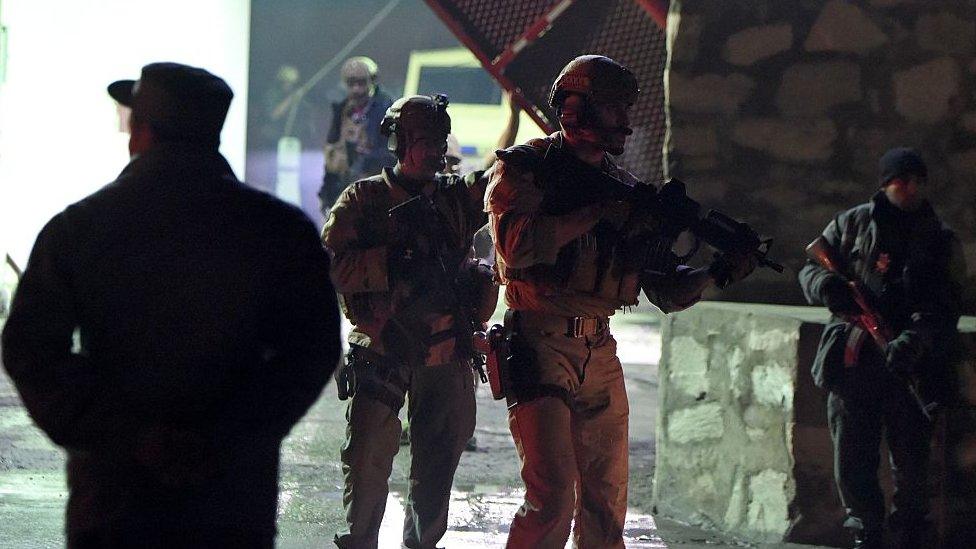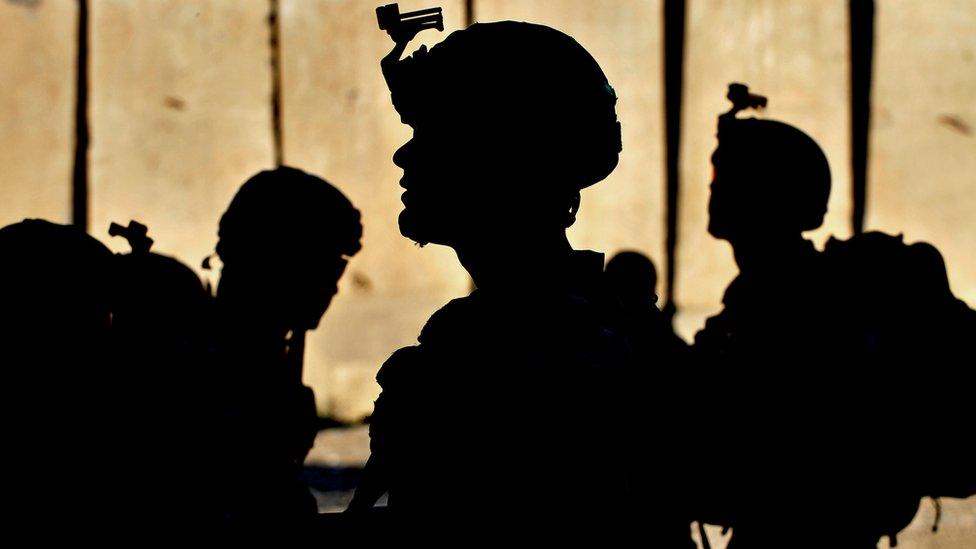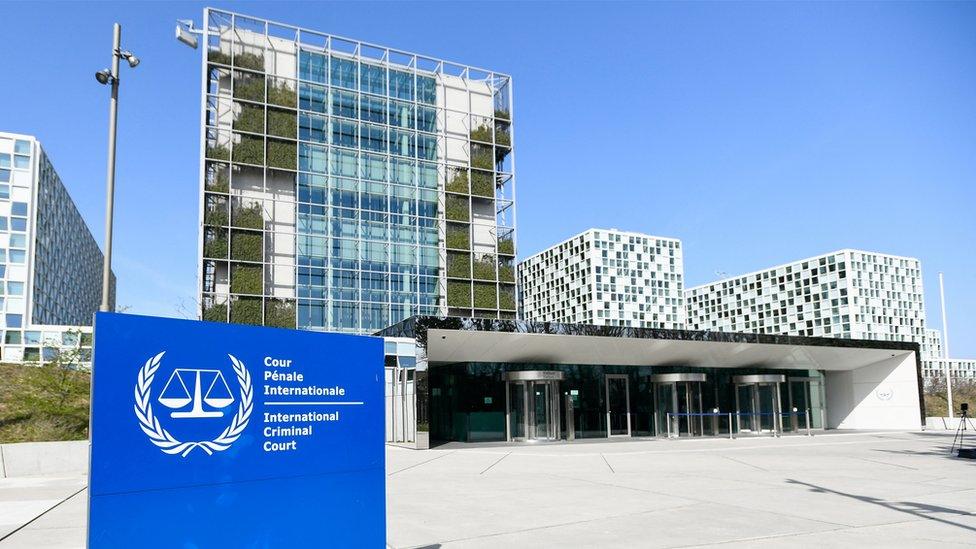Afghan conflict: US sanctions 'kangaroo' ICC over war crimes probe
- Published

Secretary of State Mike Pompeo (R) said the US would not be "threatened by a kangaroo court"
President Donald Trump has imposed sanctions on court officials who are investigating whether US forces committed war crimes in Afghanistan.
The executive order allows the US to block the assets of International Criminal Court (ICC) employees and stop them from entering the country.
The ICC described the decision as an "unacceptable attempt to interfere with the rule of law".
Mr Trump has repeatedly criticised the court and questioned its independence.
The ICC investigation began after a preliminary report found reason to believe war crimes had been committed.
The US is not a signatory of the Hague-based ICC and does not recognise its authority over American citizens.
On Thursday, shortly after the executive order was signed, Secretary of State Mike Pompeo said the US would not be "threatened by a kangaroo court".
He added that the latest sanctions could also apply to family members of ICC officials to prevent them from visiting the US.
His criticism of the court was compounded by Attorney General William Barr, who alleged without evidence that "foreign powers like Russia are... manipulating the ICC in pursuit of their own agenda".
The ICC said in a statement, external that the US decision had been made "with the declared aim of influencing the actions of ICC officials" in the course of their investigations.
"An attack on the ICC also represents an attack against the interests of victims of atrocity crimes, for many of whom the Court represents the last hope for justice," it added.
Rights groups also criticised the move.
"This assault on the ICC is an effort to block victims of serious crimes whether in Afghanistan, Israel or Palestine from seeing justice," Andrea Prasow, the Washington director of Humans Rights Watch, said in a statement. "Countries that support international justice should publicly oppose this blatant attempt at obstruction."
The EU's diplomatic chief also expressed "serious concern" at the move.
"The court has been playing a key role in providing international justice and addressing the gravest international crimes," foreign affairs high representative Josep Borrell told reporters.
What's the background?
The investigation into alleged war crimes by the US and others in the Afghan conflict was given the green light by the ICC earlier this year.
Mr Pompeo vowed to protect Americans from it. "This is a truly breath-taking action by an unaccountable, political institution masquerading as a legal body," he said at the time.
The actions of the Taliban, the Afghan government and US troops since May 2003 are expected to be examined in the probe.
Afghanistan is a member of the court, but officials there have also expressed opposition to the inquiry.
In April 2019, a pre-trial chamber at the ICC ruled that the investigation should not go ahead because it would not "serve the interests of justice".
President Trump has previously pardoned troops prosecuted in the US for alleged war crimes in Afghanistan.
Last year, his administration imposed travel restrictions and other sanctions on ICC officials.
What are the allegations?
A preliminary investigation lasting more than a decade examined crimes including intentional attacks against civilians, imprisonment and extra-judicial executions.
A 2016 report from the ICC said there was a reasonable basis to believe the US military had committed torture, external at secret detention sites operated by the CIA.
The report also said it was reasonable to believe the Afghan government had tortured prisoners and the Taliban had committed war crimes such as the mass killing of civilians.
The ICC has been part of the global justice system since 2002, and it is designed to prosecute those responsible for genocide, crimes against humanity and war crimes.
But the court's operation is seen as weakened without US involvement.
- Published5 March 2020

- Published3 November 2017

- Published7 February
